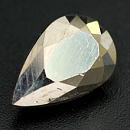|
|
|
|
Click on a letter above to view the list of gems. |
|
|
|
|
|
Pyrrhotite |
|
| Chemistry: Fe1-x S (x=0 to 0.17) [Iron Sulfide] | |
| Discovered
in 1835;
IMA
status: Valid (pre-IMA; Grandfathered). | ||
|
| ||
|
Classification |
|
|
| |
|
Sulfides | |
|
2/C.19-20 | |
|
|
2 : SULFIDES and SULFOSALTS (sulfides, selenides, tellurides;
arsenides, antimonides, bismuthides; sulfarsenites, sulfantimonites,
sulfbismuthites, etc.) |
|
Related to: |
Troilite - Pyrrhotite - Haideite Series |
|
|
|
|
Crystal Data |
|
|
|
|
|
Crystals typically tabular or platy, to 40 cm; steep pyramidal faces or short pyramidal; as rosettes showing nearly parallel aggregation; commonly massive, granular. |
|
|
On [1012] |
|
|
|
|
|
Physical Properties |
|
|
|
|
|
None observed; distinct Parting on [0001] |
|
|
Uneven to Sub-Conchoidal |
|
|
Brittle |
|
|
3.5 - 4.5 |
|
|
VHN = 373-409 (100g load) |
|
|
4.58 - 4.65 (g/cm3) |
|
|
None |
|
|
Not Radioacitve |
|
|
Other: |
Magnetic; varying in intensity inversely with iron content. |
|
|
|
|
Optical Properties |
|
|
|
|
|
Bronze Brown, Bronze Red, or dark Brown; tarnishes quickly, rarely to iridescence |
|
|
Opaque |
|
|
Metallic |
|
|
n/a (Opaque) |
|
|
n/a (Opaque) |
|
|
n/a (Opaque) |
|
|
Weak |
|
|
Strong |
|
|
|
|
|
Occurances |
|
|
|
|
|
Geological Setting: |
Mainly in mafic igneous rocks, typically as magmatic segregations; also in pegmatites, and in high-temperature hydrothermal and replacement veins, and in sedimentary and metamorphic rocks; in iron meteorites. |
|
Common Associations: |
Calcite, Chalcopyrite, Dolomite, Magnetite, Marcasite, Pentlandite, Pyrite; and many other sulfides |
|
Common Impurities: |
Ni,Co,Cu |
|
Type Locality: |
n/a |
|
Year Discovered: |
1835 |
|
View mineral photos: | |
|
|
|
|
More Information |
|
|
|
|
|
| |
|
|
|
|
|
|
|
We
have not photographed the Pyrrhotite gems. Please
check back soon. |
